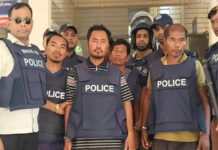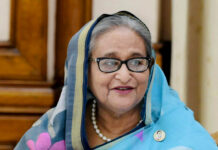
The ruling Awami League-led government has failed to eradicate illiteracy in the country as it pledged 11 years ago in its election manifesto.
Back in 2008 the party made the promise to eliminate illiteracy by 2014 but the government statistics show that more than 26 per cent people are still illiterate in Bangladesh, even though the AL-led government has been in power for three consecutive terms.
Senior educationists have blamed faulty planning, lack of financing and social stigma as challenges in eliminating illiteracy while government officials attributed poverty for the situation.
The government statistics also show that there are differences in the literacy rates between rural and urban areas.
Against this backdrop, the International Literacy Day 2019 is going to be observed in Bangladesh like elsewhere in the world tomorrow.
At a press conference at the secretariat on Thursday, the state minister for primary and mass education Md Zakir Hossain said that currently the literacy rate was 73.9 per cent in the country, which was 53.5 per cent in 2005.
According to the ministry, the literacy rate counted the people aged 15 and above.
The ministry also said that the rate was 81.7 per cent in urban and 67.3 per cent in rural areas while educationists blamed lack of facilities in rural areas for the urban-rural gap.
The literacy rate among those aged between seven years and 14 years is now 73.2 per cent.
The rate of enrolment at the pre-primary level is currently 97.85 per cent while the dropout rate at the primary level is 18.6 per cent and the rate of completion of primary level (Class V) is 81.4 per cent.
Primary and mass education ministry secretary Md Akram-Al-Hossain told New Age that they recognised a person as literate if he or she could write and read a letter in Bengali.
He viewed that poverty was a challenge in eliminating illiteracy as many parents compelled their children to engage in work by leaving school.
‘No children are out of the coverage of our schools,’ he said, adding, ‘Now our challenge is to bring them to school and ensure quality education.’
The government has also taken up a school-feeding programme to attract the children to school and ensure their nutrition besides providing them with free textbooks, he said.
Replying a question, Akram pointed at greater awareness among the people living in urban areas than in rural for the difference in the urban-rural rates.
‘I don’t think the difference is caused by lack of facilities in rural areas as all of our villages have schools now,’ he said.
The secretary also viewed that the existing situation would change very soon.
‘There is also confusion over the definition of literacy due to lack of conceptual clarity,’ said Campaign for Popular Education executive director Rasheda K Choudhury, adding, ‘The authorities count the rate by self-rating by asking questions like “Can you read or can you write”?’
She said that when they conducted a study on the same issue they arranged tests and found that the percentage was not like the one given by the government.
‘Even if we accept the government statistics, then a huge number of people are still illiterate, which is a big challenge,’ she observed.
Secondly, while the literacy rate counted the people of 15 years or above, a priority issue of this age group of people was livelihood, she explained.
Rasheda said that the government had taken up a programme under the Bureau of Non-Formal Education for making people literate and skilled but the authorities excluded the skill programme due to lack of financing, which was also a challenge.
She doubted the possible results of this programme and added, ‘Our programmes are project-based and when the projects conclude the programmes also conclude, which shows a huge deficiency in the planning and this is [also] a challenge.’
In our society a negative mindset persisted about education of adult people, the educationist said.
‘The government at different times in its manifestos pledged to eliminate illiteracy and also achieved progress at the primary level,’ she said, suggesting a continuous programme for developing literacy and skills to make all people (genuinely) literate.
Bangladesh University of Engineering and Technology’s computer science and engineering professor and educationist Mohammad Kaykobad said that the existing illiterate people could not be made literate under the formal education system.
He urged the authorities to encourage students and the country people to come forward voluntarily and make adult people literate and get educated.
‘We don’t need any more project [in this area] as Bangladesh has limited resources,’ he added.
Source: New Age.









